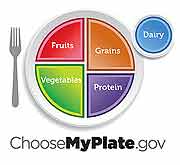A
B
C
D
E
F
G
H
I
J
K
L
M
N
O
P
Q
R
S
T
U
V
W
X
Y
Z
Click a letter to see a list of conditions beginning with that letter.
Click 'Topic Index' to return to the index for the current topic.
Click 'Library Index' to return to the listing of all topics.
Diet to Help Prevent Heart Disease
Eating a healthy diet can help prevent a number of problems, such as high cholesterol and heart disease. But knowing exactly what a healthy diet looks like can be a challenge.
The USDA and the U.S. Department of Health teamed up to create an easy way to build a healthy diet for yourself. It’s called MyPlate. It uses a simple graphic to help you make healthy food choices to lower your risk for heart disease, as well as cancer, diabetes, and high blood pressure.
Following a healthy diet plan
MyPlate offers recommendations from the 5 major food groups to help you eat a healthy diet. It also helps you choose the right portions of each food group by showing how much of each group belongs on your plate. The website ChooseMyPlate.gov has many other tools to help you learn how to select healthy foods.

MyPlate is divided into 5 food group categories, emphasizing the right amount of each food:
-
Grains. These include foods made from wheat, rice, oats, cornmeal, barley, or another cereal grain. Examples include whole-wheat, brown rice, and oatmeal. Most of grains that you eat should be whole grains. These have more fiber, iron, and vitamins than refined grains.
-
Vegetables. Vary your vegetables. Choose a variety of vegetables, including those that are dark green, red, and orange. Also choose peas and beans, and starchy vegetables.
-
Fruits. Any fruit or 100% fruit juice counts as part of the fruit group. Fruits may be fresh, canned, frozen, or dried. Eat them whole, cut-up, or pureed.
-
Dairy. Milk products and many foods made from milk are part of this food group. Focus on fat-free or low-fat dairy products, as well as those that are high in calcium. If you are lactose intolerant, consider options like soy, rice, and almond milk. They have 130 or fewer calories per 8 ounces and are a healthy alternative to milk.
-
Protein. Go lean on protein. Choose low-fat or lean meats and poultry. Vary your protein routine. Choose more fish, nuts, seeds, peas, and beans.
Oils are not a food group, yet some, such as nut oils, have important nutrients that are good for you. Stay away from solid fats, such as animal fats, because they are often high in saturated fat and contribute to heart disease.
MyPlate also includes guidelines on physical activity. If you are not physically active, you are more likely to get heart disease and related problems, such as high blood pressure, and high cholesterol.
Talk with your healthcare provider before starting an exercise program. They can help you figure out your exercise needs, and any risk factors you have for heart disease.
Online Medical Reviewer:
Rita Sather RN
Online Medical Reviewer:
Stacey Wojcik MBA BSN RN
Online Medical Reviewer:
Steven Kang MD
Date Last Reviewed:
2/1/2023
© 2000-2024 The StayWell Company, LLC. All rights reserved. This information is not intended as a substitute for professional medical care. Always follow your healthcare professional's instructions.